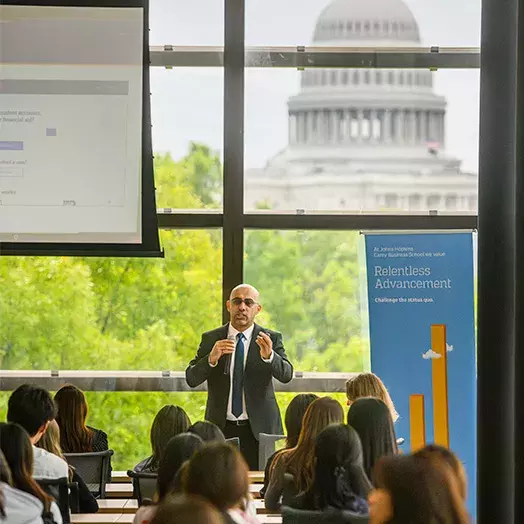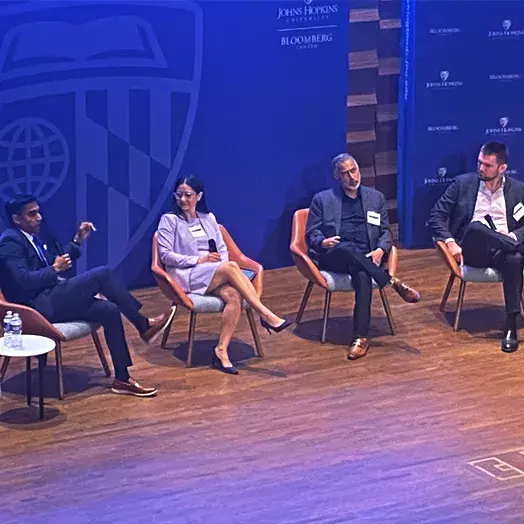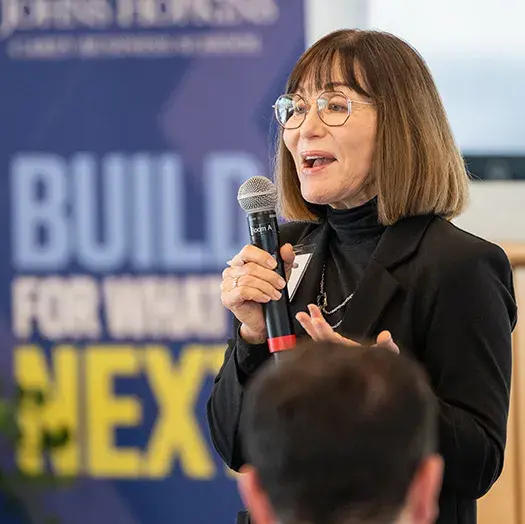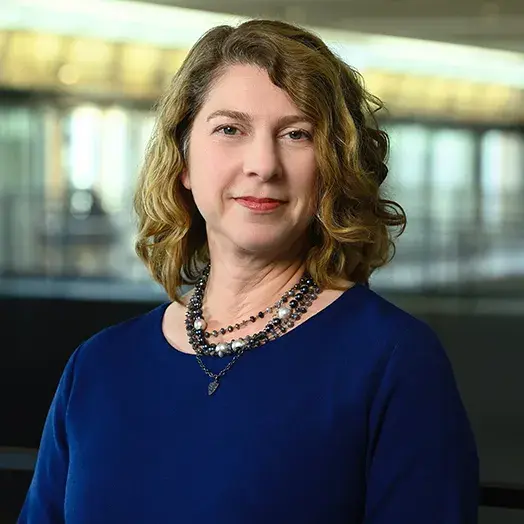Nexus Awards unite Johns Hopkins faculty in addressing societal challenges.

Nexus Awards empower Carey faculty to explore gender equity, generative AI, health care policy, and other societal challenges
Merriam-Webster defines nexus as “a connection or link between things, persons, or events.” It is in forging connections to address important challenges that Johns Hopkins University created the $15 million Nexus Awards Program to support research, teaching, and event programming at the new Johns Hopkins University Bloomberg Center in Washington, D.C. With the latest round of Nexus Award funding, many Carey faculty will collaborate with faculty from other divisions over the coming year on issues ranging from climate resilience and population displacement to generative AI and enhanced learning to mental health and health equity.
“Business is an essential force in our world. It helps society function by bringing efficiency, sustainability, and scale to everything we do,” said Carey Business School Dean Alex Triantis. “The Nexus Awards are a tremendous opportunity for Carey faculty to combine their strengths and insights with innovators from across Johns Hopkins and to tackle some of our toughest challenges.”
Nexus Awards are available in three categories: convening, research, and teaching. Convening awards provide teams with up to $100,000 to develop and execute an academic or policy-focused conference or a series of conferences on any topic. Research awards teams provide up to $300,000 to foster collaborative work in fundamental, clinical, or applied research. Teaching awards provide $25,000 for undergraduate or graduate courses and co-curricular opportunities.
Carey faculty Nexus Awards recipients for 2024 include:
Convening
- Advancing Gender Equity Research to Create Sustainable Change: David Smith (Carey), Colleen Stuart (Carey), Anna Kalbarczyk (BPSH), Michele Decker (BSPH)
- AI-Powered Strategies to Address Inequities in Deaths of Despair: A Series of Translational Workshops: Emily Haroz (BSPH), Roland Thorpe (BSPH), Alexis Battle (WSE), Kadija Ferryman (Berman), Keshia Pollack Porter (BSPH), Mathew Eisenberg (BSPH), Roy Adams (SOM), Gordan Gao (Carey), Anjalie Field (WSE)
- The Fragmenting Global Economy: Jonathan Hoddenbagh (SAIS), Laurence Ball (KSAS), Francesco Bianchi (KSAS), Gordan Bodnar (SAIS), Vadim Elenev (Carey), Stelios Fourakis (KSAS), Olivier Jeanne (KSAS), Ryan Kim (SAIS), Annie Lee (SAIS), Alessandro Rebucci (Carey), Carlos Vegh (SAIS)
- The Future of Health Care Delivery: Melinda Buntin (BSPH/Carey), Daniel Polsky (BSPH/Carey), Matthew Eisenberg (BSPH)
- Thriving through Crisis and Conflict? Interdisciplinary Insights for an Uncertain Future:Brian Gunia (Carey), Suntae Kim (Carey), Kathleen Sutcliffe (Carey), Adria Lawrence (SAIS), Sergey Radchenko (SAIS), Sinisa Vukovic (SAIS), Elayne Whyte-Gomez (SAIS)
Research
- Elevating Evidence-Based Medicaid Home-and Community-Based Long-Term Services and Supports: A Compendium of Policies: Katherine Miller (BSPH), Maya Rockeymoore Cummings (BSPH), Chanee Fabius (BSPH), Karen Shen (BSPH), Jennifer Wolff (BSPH), Melinda Buntin (BSPH/Carey), Kali Thomas (SON), Cynthia Boyd (SOM)
- The Johns Hopkins Drug Supply Chain Data Dashboard: Improving Data Transparency and Increasing Resiliency in the U.S. Pharmaceutical Supply Chain: Mariana Peixoto Socal (BSPH), Jeromie Ballreich (BSPH), Gerard Anderson (BSPH), Maqbool Dada (Carey), Tinglong Dai (Carey), Jeremy Greene (SOM), Josh Sharfstein (BSPH)
What to Read Next

business of health
Will AI be the prescription for better health?Teaching
- Generative AI: Minghong Xu (Carey), Graeme Warren (Carey), Xiangyang Li (WSE)
- JHU Leadership Challenge: Chris Myers (Carey)
- Regulation and Policy's Influence on Investment in Health Care: Emilia Simeonova (Carey), Melinda Buntin (BSPH/Carey)
Check out the Johns Hopkins Hub for more information about the Nexus Awards Program and the latest round winners.


